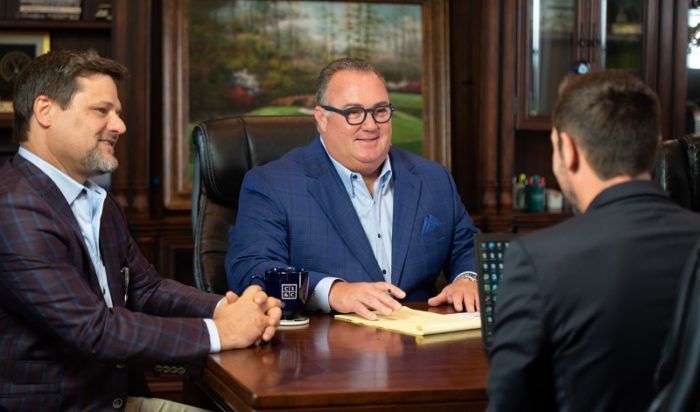Most financial “advisors” receive minimal training and while many eventually end up becoming competent, they leave damage behind in the process.
Our new clients often wonder why I might have a couple of extra team-members in one of our meetings. The extra cast will be sitting quietly, taking notes.
The answer is that I am on a mission to improve financial advisor competence. I know that someday I will either retire or exit this world and I have an obligation to my clients to leave them with someone who can provide similar guidance to what they have experienced with me. Think about this, would you hire a “surgeon in training” whose training consisted of unsupervised practicing on patients to improve their skills? By the hit or miss method, they would eventually learn their craft—but who gets to go first?
Most financial “advisors” receive minimal training and while many eventually end up becoming competent, they leave a lot of damage behind in the process. Typically, when an “advisor” or “agent” joins a new firm, they may be given a few weeks of product instruction and some sales training. It gives the newbie enough information to sound credible, be able to fill out a form, transfer in some assets and collect a commission or fee. The general public has limited financial knowledge and someone with a few weeks of training should have enough verbiage to sound sharp. This is akin to old adage that “In the land of the blind, the one-eyed man is king.” Like the surgeon learning on the job, the typical new advisor is going to make their mistakes on their earliest clients. This may explain why many firms, especially some of the large insurance companies, suggest that newbies first approach their family for business. Family members are less likely to file a complaint if a situation goes sideways.
Our Mentoring Process
With the recognition that our industry had a severe lack of training and if we were going to be viewed as professionals and not simply salespeople, I began a mentoring process that is designed to develop competency in multiple areas before one of our team members even has the opportunity to approach a client directly. In the first 2-3 years of our new associates’ careers, they will work under the direct supervision of an experienced, credentialed advisor. The associate will listen to new client interviews, current client reviews, handle follow up issues that require research and provide administrative support. They will not make any investment decisions, recommend any products or give any advice.
This process will often involve over 200 client meetings where they listen to the senior advisor, learn the rules and regulations of the industry, start to understand how to design a financial plan, learn the main tax rules surrounding capital gains, IRAs, and deferred income products and generally soaking up the knowledge that they will need to guide their own clients.
Over the years, I have trained over a dozen young advisors in this process. I generally default to the Socratic method while I am teaching and attempt to ask as many questions as I can to lead the young associate to the answer they are seeking. I have found that if you run through the mental process of asking questions, you will have better recall of the answer or have a better idea of where to find the answer. Even if it would be simple to answer the question, I want my team to know how to think and solve problems.
The approach we bring to problem-solving is the greatest value that we bring to our clients. Frequently, we identify problems (i.e. estate taxes, poor beneficiary planning, missed income tax opportunities) that they do not even realize they have. This aspect of our work creates the massive value we provide to our clients and their families.
In the process of working with trainee advisors, I have been compared to a drill sergeant and told that a run a “financial navy seal” training operation. I must admit that I like the analogy because I am confident that if an associate survives our training program, they will truly be able to help their clients. The training does not end with sitting in meetings and listening to real world scenarios. Each new advisor who joins our firm begins that training for the CERTIFIED FINANCIAL PLANNER™ designation. They are also given training in retirement planning, taxes, estate planning and investment management through formal and informal programs. Each associate has a budget to attend conferences, webinars, purchase books and improve their skills. As a firm, we provide a bonus to our team-members each time they complete a new designation.
Staff Professional Designations
We are proud to have multiple CFP® professionals on our staff. We also have 2 team members with Master’s degrees in financial planning. Two of our advisors have an Accredited Estate Planner designation and I also hold a Chartered Advisor in Philanthropy designation. As would be expected, we hold ourselves to the fiduciary standard, and I am also an Accredited Investment Fiduciary® Designee.
As a consumer, you have a choice but may not even realize the difference in service providers. If you are considering engaging a new financial advisor, do yourself a favor and ask how they were trained. If you are told that the extent is that they studied for the Series 7 and then got an insurance license by taking a training class, ask yourself if you would hire the physician who had taken chemistry and biology classes but never worked on a human. I am reminded of the 1967 Cat Stevens song (later recorded by both Rod Stewart and Sheryl Crow) “The First Cut is the Deepest”. While it was not referring to medicine or financial planning, the message is that a lack of genuine experience can do significant damage.
• • • • •




